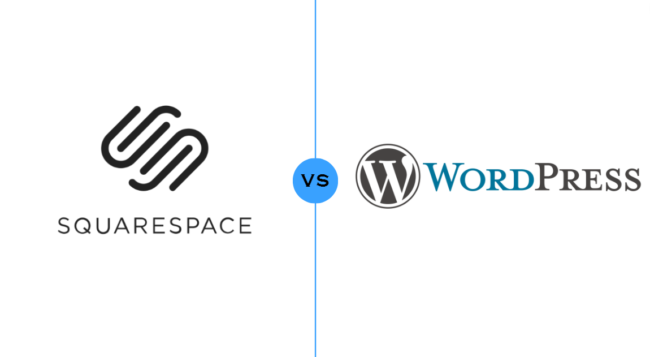- What is Squarespace & WordPress?
- Cost and rating of the website builders
- The target audience of WordPress and Squarespace
- Ease of use
- Templates design and extensions
- eCommerce functionality
- Content management and blogging tools
- What about larger sites?
- Forms and capturing data
- SEO tools and website maintenance
- Security of the builders
- Multilingual & customer support
- Verdict
- Alternative website builders
Are you at the crossroads of website creation, torn between Squarespace and WordPress?
Look no further! In this article, we embark on a comprehensive exploration of these two leading website-building platforms: Squarespace and WordPress.
We leave no stone unturned as we analyze content management, SEO features, ease of use, and more. Our mission is to equip you with the knowledge you need to make an informed decision. So, which platform will best serve your business goals?
Let’s delve into the Squarespace vs WordPress showdown and discover the ideal solution for your website needs.
Quick overview of Squarespace vs WordPress:
Using WordPress website instead of Squarespace

One prominent benefit of choosing WordPress over Squarespace is its flexibility and open-source nature.
While Squarespace follows a relatively restrictive approach to web design, WordPress empowers you to create virtually any type of website you imagine. Although it may require coding or utilizing plugins, WordPress offers unlimited customization options.
With WordPress, you can create websites that have custom designs, specialized features and are optimized for search engines.
It’s the perfect choice for those who want to build websites that are truly unique and personalized, going beyond the limitations of a restrictive approach.
In summary, WordPress emerges as the go-to platform when it comes to creating websites that demand unmatched flexibility, distinct features, and exceptional search engine optimization performance.
Using Squarespace instead of WordPress

One advantage of opting for Squarespace instead of self-hosted WordPress is the simplified setup and maintenance process. Building and managing a Squarespace website require significantly less effort compared to WordPress.
Squarespace boasts a minimal learning curve, making it accessible even to those new to web design. Its intuitive drag-and-drop page builder offers greater flexibility than the equivalent feature in WordPress.
Moreover, many features that exist separately in WordPress come pre-packaged with Squarespace. In essence, Squarespace is going to be a better choice for individuals starting into web design with limited experience.
Comparing the two website builders
| Platform | Starting Price | Rating | Key Features |
|---|---|---|---|
| Squarespace | $12/month | 4.5 based on 10,000+ reviews | drag-and-drop builder, templates, e-commerce functionality, SEO tools, 24/7 customer support |
| WordPress | Free (self-hosted) | 4.8 based on 50,000+ reviews | Open-source platform, Customizable themes and plugins, SEO-friendly architecture, user community and support resources |
In this comparison between Squarespace and WordPress, you’ll discover:
- What the website builders can do and their capabilities.
- How easy they are to use.
- The main advantages and disadvantages of each.
- The costs associated with using both platforms.
- Alternative options you can consider.
By the end of this article, you’ll have a clearer understanding of which platform suits your project best, or if using a different website builder would be a better choice.
Now, let’s begin with an important question…
What is WordPress?
WordPress is a popular and widely-used content management system (CMS) and website creation tool.
It provides a user-friendly interface that allows individuals and businesses to build and manage their WordPress websites without requiring extensive coding knowledge.
Originally developed as a blogging platform, it has evolved into a versatile CMS that can be used to create various types of websites, including blogs, business websites, eCommerce stores, portfolios, and more.
There are two versions of WordPress:
1.) Hosted WordPress
Hosted WordPress, found at wordpress.com, functions as a software-as-a-service (SaaS) website builder similar to Squarespace.

To use the platform, you select a plan and pay a recurring fee, either monthly or annually. The available plans include Free, Personal, Premium, Business, eCommerce, and Enterprise.

The costs vary based on the chosen plan, and if you opt for an annual payment, the monthly fees are discounted accordingly.
The plan provides a web hosting account, storage, and a wide range of features to facilitate website creation and maintenance. Higher-priced plans offer more advanced eCommerce features.
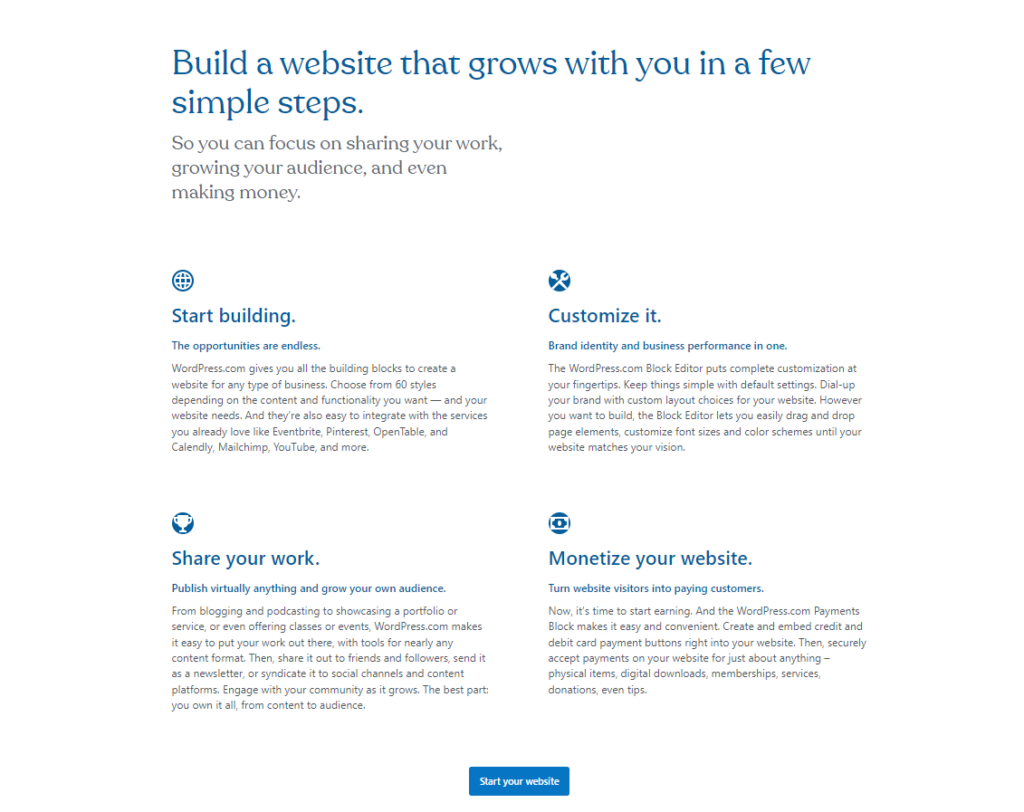
2.) Self-hosted WordPress
Self-hosted WordPress is a downloadable software accessible from wordpress.org that you install on your own web server.
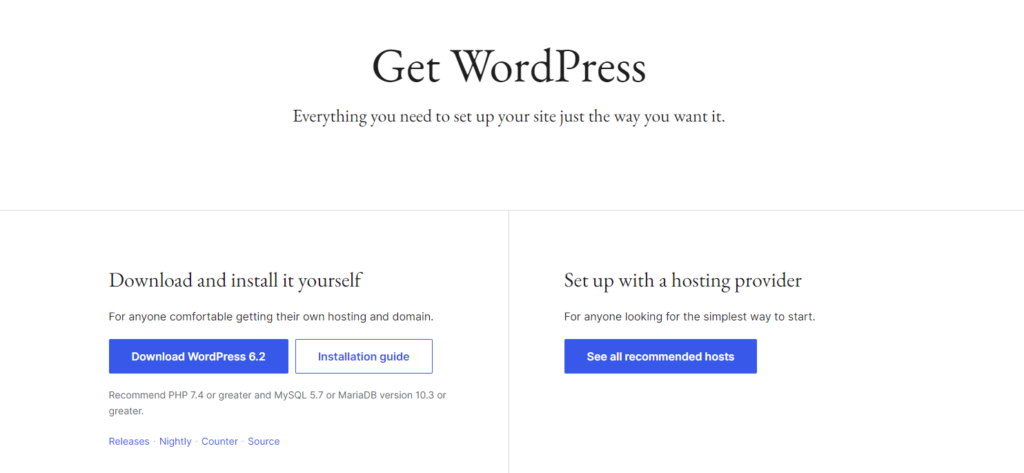
It operates as an open-source platform, meaning that its source code is freely available and can be easily modified. This flexibility allows WordPress sites to be extensively customized, making it a versatile tool for various website design projects.
Learn how to start your website with WordPress in our beginner’s guide.
While the WordPress software itself is free, there are associated costs to consider, such as hosting, domain name registration, and third-party plugins or development expenses.
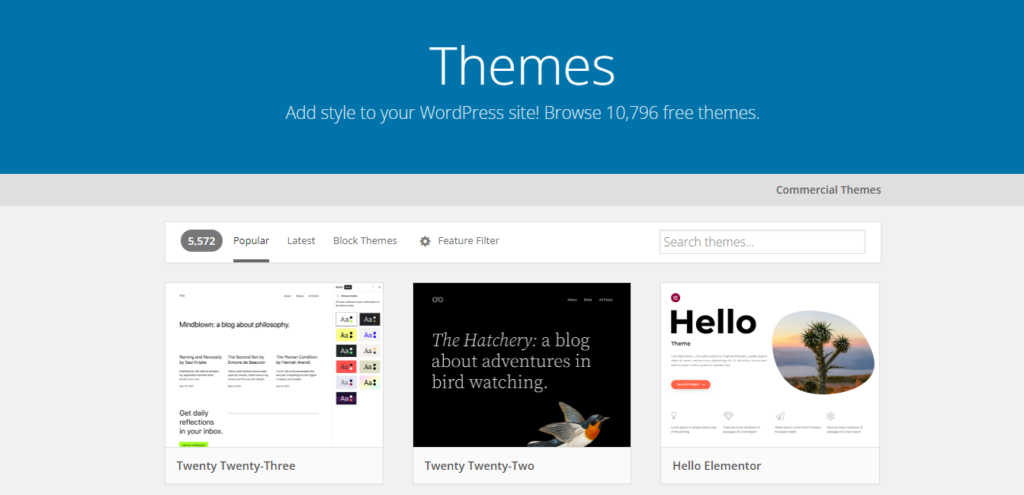
Later in the review, these aspects will be discussed in greater detail.
What is Squarespace?
Squarespace is a hosted website builder that operates on a “software as a service” (SaaS) model. By paying a monthly fee, you gain access to all the essential elements required for building and maintaining your website.

These elements include templates, a content management system (CMS), hosting services, eCommerce functions, support, and even a domain name if needed.
It has also introduced additional marketing tools like Squarespace Email Campaigns and Squarespace Video Studio to enhance its all-in-one approach.

The core concept behind Squarespace is to provide a user-friendly solution that eliminates the need for coding knowledge. You can construct and modify your website without dealing with CSS or HTML directly, although the option to add code is available for advanced users.
Founded in 2004, Squarespace currently powers approximately 3 million websites according to Builtwith.com, an internet statistics company.
Which versions of Squarespace and WordPress are being compared in this post?
This comparison focuses on comparing both Squarespace and the self-hosted version of WordPress.
The purpose of this approach is to provide readers with a comparison between an all-in-one, pay-monthly hosted solution (Squarespace) and an open-source platform (WordPress) that offers greater power and flexibility but requires more hands-on configuration.
Prices of WordPress
“As far as I know WordPress is free!” you might say. Well, not exactly.

While WordPress itself is open source and free to use, there are other expenses you need to consider for a fully functional WordPress website.
5 hidden costs of a WordPress site:
- Hosting: This provides server space to install WordPress and store your site.
- Themes: These determine the design of your site.
Check out the best WordPress themes for Elementor in our article.
- eCommerce integration: An add-on that enables you to sell products online.
- WordPress plugins: Additional apps that enhance your site’s functionality.
- Developer (optional): Hiring a developer can greatly improve your results.

Hosting is a necessary cost since you need a place to install WordPress. You have two main options: shared hosting or managed WordPress hosting. While shared hosting is more affordable, managed WordPress hosting offers better performance and security at a higher price.
Compare web hosting costs of the best providers in our article.
The startup costs for WordPress hosting typically range from $8.95 per month (with shared hosting) to $35 per month (with managed hosting) for a small business website.
Regarding other expenses, it is possible to use free WordPress themes, eCommerce integrations, and plugins. However, investing in higher-quality options often yields better results.

Here are some example costs for building a WordPress website:
- Hosting (using Kinsta as an example): $350 per year (recurring cost).
- Premium theme: $175.
- eCommerce integration (e.g., Ecwid): $169 per year (recurring cost).
See the best plugins & themes for WordPress eCommerce in our article.
- Paid WordPress premium plugins: $100.
- WordPress maintenance service (keeping your site up to date): $50 per month (recurring cost).
If you hire a WordPress developer for configuration, building, and maintenance, the costs will be higher but result in a better product.
Comparing these costs to the Squarespace plan, the pricing varies depending on the plan and payment frequency.
Generally, Squarespace costs between $192 and $780 per year. Surprisingly, Squarespace can sometimes be more cost-effective than WordPress, despite being a paid option while WordPress is free and open source.
However, pricing is just one aspect to consider, and the project’s specific requirements and priorities play a significant role in the decision-making process.
Prices of Squarespace
Understanding Squarespace costs is relatively straightforward, as there are four main plans available:
- Personal: $23 per month
- Business: $33 per month
- Basic Commerce: $36 per month
- Advanced Commerce: $65 per month
Paying annually offers significant savings, with monthly costs of $16, $23, $27, and $49 respectively. Additionally, when you choose the annual payment option, Squarespace provides a free custom domain name.
Check out our article about domain names and their costs and see how to get a free domain easily.
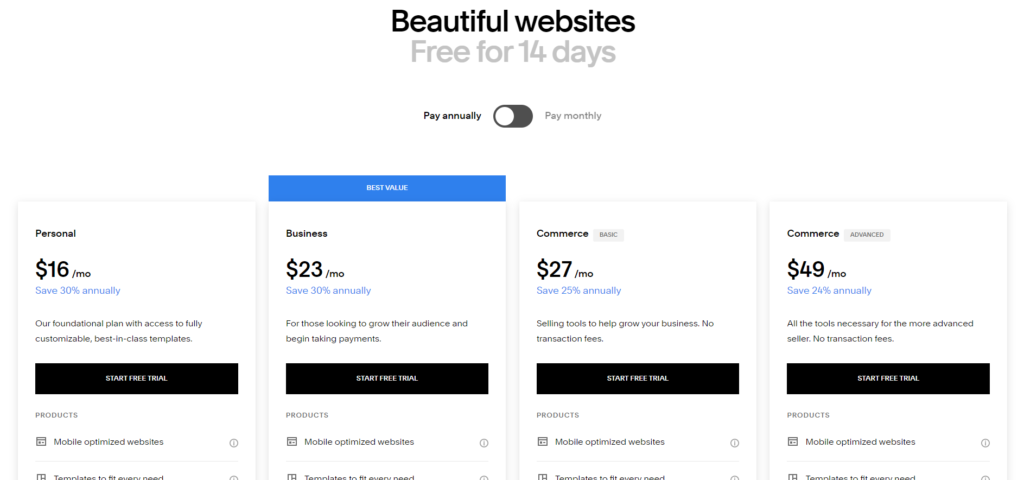
It’s worth noting the key differences among the Squarespace plans, including eCommerce features, the ability to add custom CSS and scripts, transaction fees, and integration with third-party apps.
The “Personal” plan is more limited and less suited for business purposes, lacking eCommerce functionality, customization options, and app integrations.
For a professional website, the recommended choice is typically the “Business” plan or higher, starting at $33 per month.

Higher-priced Squarespace plans offer more advanced features, particularly in terms of eCommerce capabilities.
For a more detailed overview of each Squarespace pricing plan’s differences, you can refer to our full Squarespace review or Squarespace pricing guide.
Note: The pricing information mentioned here is subject to change, and it’s recommended to visit the official Squarespace website for the most up-to-date details.
Who are the target audiences for Squarespace vs WordPress?
WordPress:
- WordPress users don’t need web development skills, particularly with the hosted version.
- The self-hosted version requires more configuration and has a steeper learning curve for website setup.
- WordPress serves another audience: users with coding skills who want to:
- Create extensively customized websites.
- Access more functionality beyond what Squarespace offers.
- Due to its open-source nature, WordPress provides greater flexibility and control for users with coding skills.
Squarespace:
- Squarespace’s core audience consists of users without web development skills.
- Its goal is to empower anyone, regardless of coding ability, to create their own website.
- Squarespace follows a “walled garden” approach, tightly controlling the platform to:
- Create a user-friendly interface.
- Prevent scenarios where users accidentally break their site.
- Maintain the quality of the templates.
Squarespace vs WordPress – Ease of use
Squarespace
The user interface of Squarespace is designed to be user-friendly and intuitive.

Navigating through the platform is easy, and making changes to the design of your website is a straightforward process.
Using the style editor, you can quickly modify basic template elements such as font colors, heading sizes, and more.
Simply select the design element you want to change and use the provided controls to make the desired modifications.
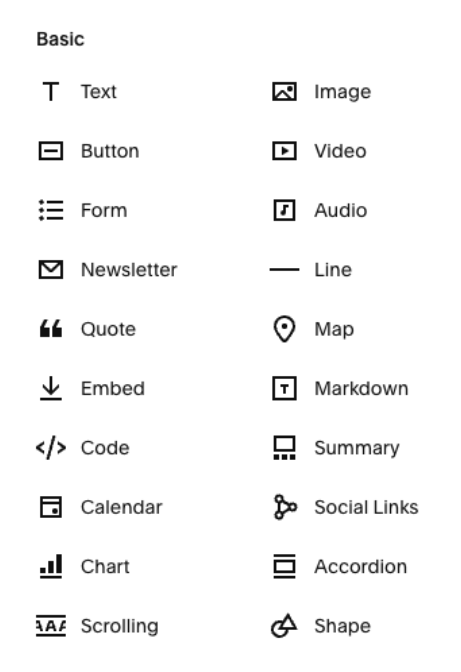
It is a convenient drag-and-drop editor that simplifies the process of arranging your content exactly how you want it.
You can easily move text and image blocks around the page by dragging and dropping them, and even incorporate content from other sections of your site, such as images from galleries or blog post summaries.
Moreover, there is a new version of its drag-and-drop editor called “Fluid Engine.”
This enhanced editor provides additional editing capabilities, including the ability to create different versions of your website optimized for mobile devices and desktop computers.

With the Fluid Engine editor, you have the freedom to position elements anywhere on your page, while benefiting from the “snap-to-grid” feature that automatically aligns your designs for a polished look.
WordPress
The CMS offers a user-friendly editing experience once your website is set up.
Although the initial setup and configuration may require some effort depending on your hosting provider, it is intuitive and highly responsive.
The key difference between WordPress and Squarespace lies in their approaches to on-page editing.
In Squarespace, you can simply navigate to the page you want to edit, click on the content you wish to change, and see your edits in real-time as you make them.
On the other hand, WordPress, by default, requires you to edit the page in the back end and preview or publish it before seeing the changes on the actual page.
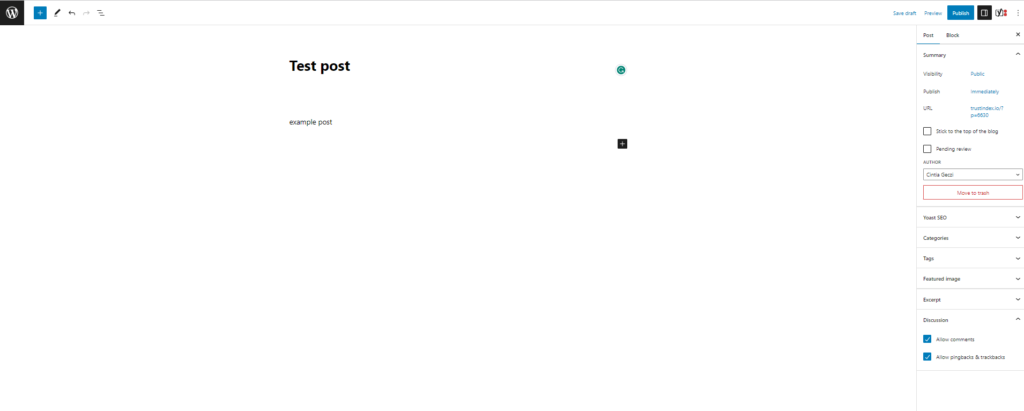
However, there is flexibility to adjust this workflow to better suit your needs. By exploring and configuring front-end visual editor plugins like Elementor or Divi, you can introduce a more Squarespace-like approach to content management.

It’s important to be cautious with such plugins as they can potentially slow down your site and impact search engine performance.
Additionally, the introduction of WordPress’ Gutenberg editor has brought content editing closer to Squarespace’s style.
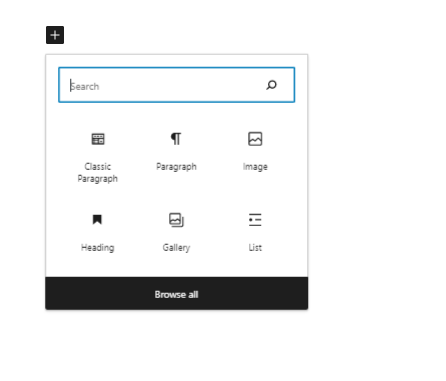
Gutenberg utilizes content blocks and a drag-and-drop layout approach, allowing for easier content arrangement on the page.
Overall, while Squarespace may provide a slightly smoother editing experience for newcomers, the WordPress dashboard and CMS are straightforward to use and won’t pose a significant learning curve.
Templates and design
WordPress and Squarespace both provide users with pre-designed templates and design tools to simplify the process of creating a personalized website. Let’s explore the range of choices and tools offered by each platform.
WordPress
There are a vast collection of both free and premium themes, which serve as website templates. These themes are highly customizable, enabling you to incorporate your website logo, customize colors, upload your own images, and more.

Many WordPress themes offer multiple layout options, a drag-and-drop editor, sliders as well as photo galleries, and numerous other features.
Regardless of the type of web design you require, you’ll find hundreds of professionally designed templates suitable for your needs.
WordPress themes present a wide variety of options, that is to say, can be overwhelming for beginners.
You can begin with SeedProd, a drag-and-drop WordPress website builder that empowers you to design a custom WordPress theme from scratch without requiring coding skills.

Squarespace
Squarespace provides a collection of ready-made website templates conveniently categorized for different types of websites.
You’ll find Squarespace templates available for various popular website categories, each featuring professional designs that ensure a visually appealing experience across all devices.

Choosing a template for your Squarespace website is effortless, and you can customize it using the built-in customizer tool.
Squarespace templates offer a more limited selection compared to WordPress. The number of pre-made templates is relatively small, and the customization options are restricted to the features provided within the Squarespace customizer.
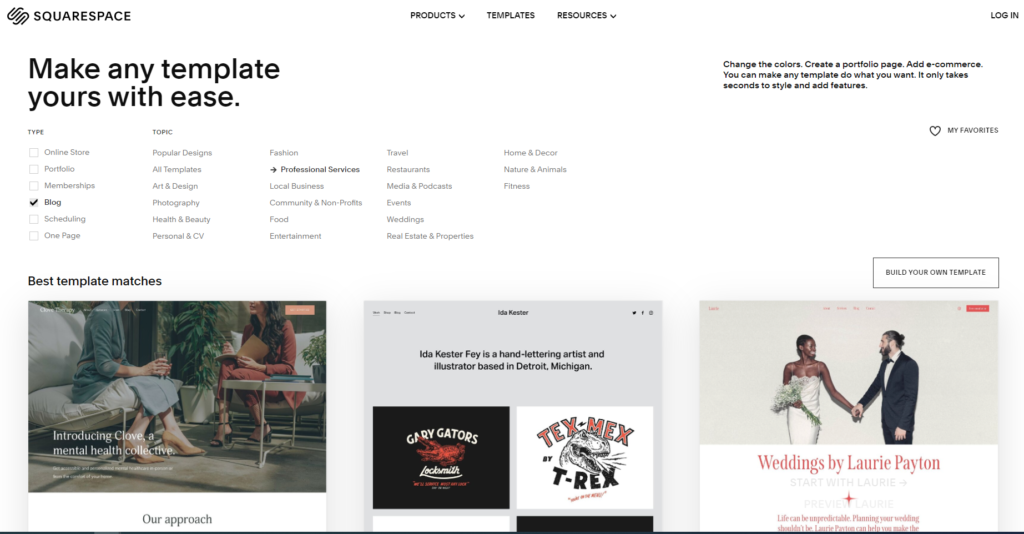
While you can still adjust colors, fonts, website logos, and other elements, these templates are not as flexible or customizable as the extensive range of WordPress themes.
Extensions and Integrations:
When it comes to expanding the capabilities of your website and integrating with third-party tools and services, both WordPress and Squarespace offer different approaches. Let’s take a closer look at each platform.
WordPress
There are a ton of plugins available to add extra features and customization options to your website. With over 60,000 free plugins available in the WordPress plugin directory, along with numerous premium options, you can easily find a plugin to fulfill almost any functionality you envision.
These plugins have their own dedicated communities, and many offer extensive add-ons and support.
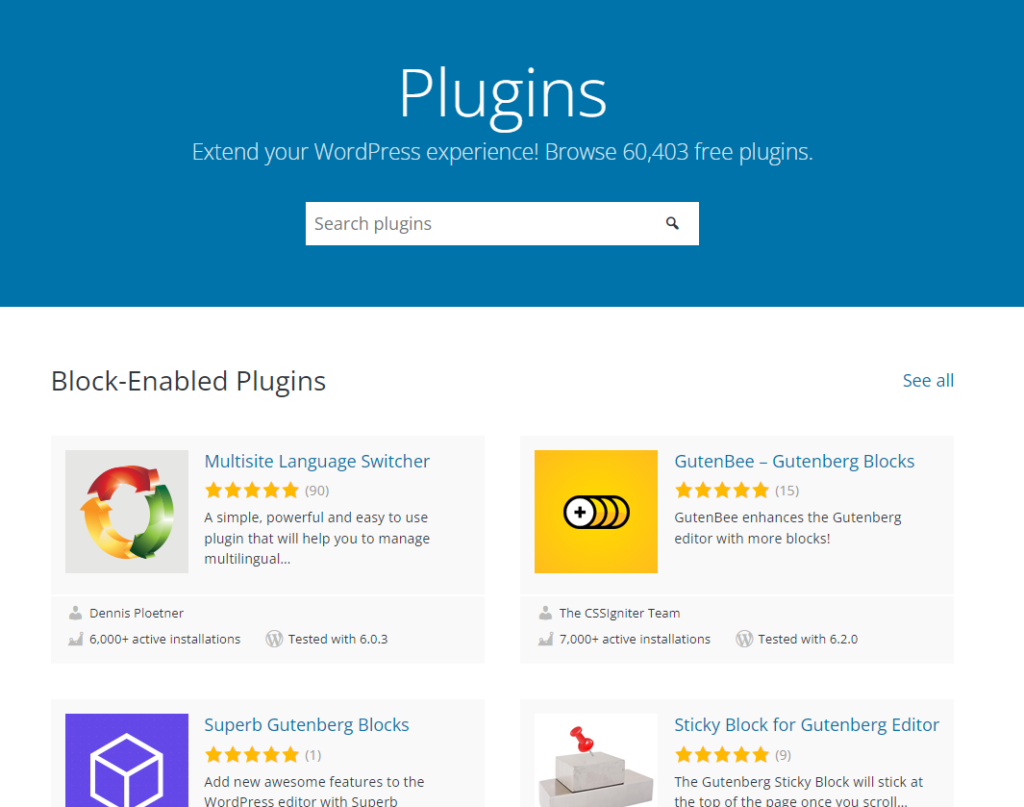
From generally needed plugins to specialized ones for eCommerce, memberships, online courses, and more, it has a plugin for nearly every need.
Furthermore, popular services, social media platforms, email marketing tools, SEO software, live chat solutions, and lead generation tools offer seamless integration with WordPress through their own dedicated plugins.
Squarespace
While Squarespace provides a limited set of extensions and integrations, it falls significantly behind WordPress in terms of extensibility.
The handful of built-in extensions and integrations are unfortunately often constrained in functionality.

Unlike WordPress, Squarespace lacks robust APIs that developers can leverage to build upon and expand its capabilities.
When it comes to eCommerce, Squarespace provides its own platform but does not allow for extensive customization or extension beyond its built-in features.
This limitation can impact your ability to create custom websites tailored to your specific online business needs.
eCommerce functionality – Squarespace vs WordPress:
If you’re considering building an online store, it’s important to compare the eCommerce functionality offered by WordPress and Squarespace. Let’s delve into the details:
WordPress
The content management system provides flexibility when it comes to integrating and using various payment processors and platforms.
You can easily accept online payments using credit cards through popular services like Stripe, PayPal, Google Checkout, 2Checkout, Payoneer, Skrill, and even Bitcoin, thanks to numerous WordPress plugins.

With plenty of eCommerce plugins available, you can transform your WordPress website into a fully functional online store in a matter of minutes.
The most renowned eCommerce plugin, WooCommerce, is specifically designed for WordPress. WooCommerce offers a vast ecosystem of add-ons and a wide range of themes tailored for eCommerce.

There are no limitations on the number of products you can add, how you showcase them, or how you sell them. You have the freedom to run your own affiliate program and utilize various strategies to boost your sales without any restrictions.
Squarespace
On the other hand, has more limited eCommerce features. It only supports Stripe and PayPal as payment processors, and these options are only available in select countries.
This restriction can hinder your ability to accept payments from a global audience.

Additionally, Squarespace only allows you to sell products with their Business or Commerce plans. The presence of transaction fees necessitates an upgrade to an eCommerce plan to save on those fees.
For instance, if you want to sell just one product, you will still have to subscribe to the Business plan. This can result in higher yearly costs compared to a shared hosting plan or VPS for WordPress.
Furthermore, Squarespace offers limited integration with third-party services, which affects your ability to promote your website and implement strategies to drive more sales and grow your business.
Content management and blogging tools:
When comparing Squarespace vs WordPress in terms of content management and blogging tools, WordPress emerges as the clear winner. Here are the four main reasons for this:
- Version History and Backups:
- WordPress provides version history functionality, allowing you to store multiple versions of pages and posts. You can easily roll back to any previous version whenever needed. Additionally, you can create and restore backups of your entire WordPress website, ensuring data security.
- Squarespace, on the other hand, does not permit version history or provide an autosave feature. This omission can lead to the loss of work in case of connectivity issues or computer crashes.
- Editing Flexibility:
- WordPress allows you to toggle between HTML and WYSIWYG (What You See Is What You Get) modes when editing your content. This grants you direct access to the underlying HTML code if desired.
- In contrast, Squarespace only offers the option to add “code blocks” but does not provide direct access to the main HTML behind your pages and posts.
- Media Library:
- WordPress offers a comprehensive media library where you can store, access, and edit your images and documents. This feature makes it easy to locate and reuse existing content on your site.

- Squarespace has made some improvements in this area with an “image reuse” feature. However, it still lacks a similar tool for efficient file management and updates.
- Blogging Flexibility:
- WordPress allows more flexible use of categories and tags, enabling you to organize and present your blog content in relevant ways. Additionally, you can create custom content types to further structure your content.
- Squarespace, while suitable for blogging, has limitations in terms of categorization and custom content types.
Suitability for complex sites
Squarespace
While Squarespace is well-suited for small businesses, it may not be the most suitable choice for building large or complex websites. Here are some considerations regarding its limitations in this context:
- Limited Website HierarchySquarespace has limitations when it comes to website hierarchies. It only allows for two levels of navigation, resulting in a “flat” website structure.This restriction may not adequately accommodate the needs of larger organizations or businesses with extensive content and services.
- Flat Navigation StructureAlthough a flat navigation structure can be advantageous for usability and content discoverability, it may not suffice for businesses requiring a deep hierarchy and multiple layers of navigation. Its navigation structure is not designed to handle complex website architectures.
WordPress
When it comes to building large or complex websites, WordPress shines as a highly suitable platform. It offers a range of features and capabilities that make it ideal for handling extensive content and diverse services:
1.) Flexible Website Hierarchy
It allows for deep website hierarchies, providing the flexibility to create multiple levels of navigation. This is particularly advantageous for large organizations or businesses with a wide variety of services and resources.
2.) Customization Options
With WordPress, you have extensive customization options available. You can choose from a vast selection of themes and templates that support complex hierarchies and multiple levels of navigation. Additionally, if needed, you can enlist the help of a WordPress developer to create a tailored solution to meet your specific requirements
Capture data with forms
Squarespace: Simplified Form Creation
Squarespace makes it easy to create visually appealing forms that capture data from your website visitors.
Here are the main types of forms available:
- Regular Forms: These customizable forms can serve various purposes such as contact forms or application forms. You have the flexibility to edit and customize them extensively to suit your needs.
- Custom Product Forms: These forms are designed for point-of-checkout scenarios, allowing users to provide specific information like text for engravings when making a purchase.
- Email Sign-up Forms: These forms are great for capturing email addresses and building your subscriber list.
While Squarespace forms provide options to capture a wide range of information, it’s important to note that file uploads are not currently supported, which can be a limitation.
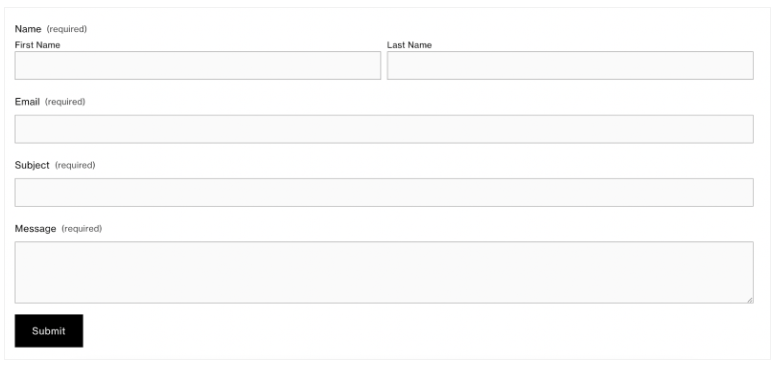
The data captured through Squarespace forms can be handled in different ways:
- Email: You can have the captured data emailed to a specific address that you specify.
- Google Sheets: The data can be added to a Google sheet for easy organization and analysis.
- Mailchimp: Integration with Mailchimp allows you to automatically send the captured data to your Mailchimp account for effective email marketing.
- Zapier: By connecting Squarespace forms with Zapier, you can integrate with various other apps and streamline your workflows.

Although Squarespace offers integrations with popular tools like Mailchimp and Google Sheets, it would be beneficial to have more direct integrations available with other apps like GetResponse, AWeber, and Campaign Monitor.
While you can still achieve integrations using Zapier or code blocks, it requires additional setup and may not be as straightforward.
If you’re comfortable working with code blocks in Squarespace, you can further customize the appearance of your forms using CSS to match your site’s design.
WordPress: Extensive Data Capture Options
Looking at Squarespace vs WordPress, this one provides robust solutions for capturing and managing data through forms. With a WordPress plugin like Gravity Forms, you can unlock a wide range of advanced features and integrations.
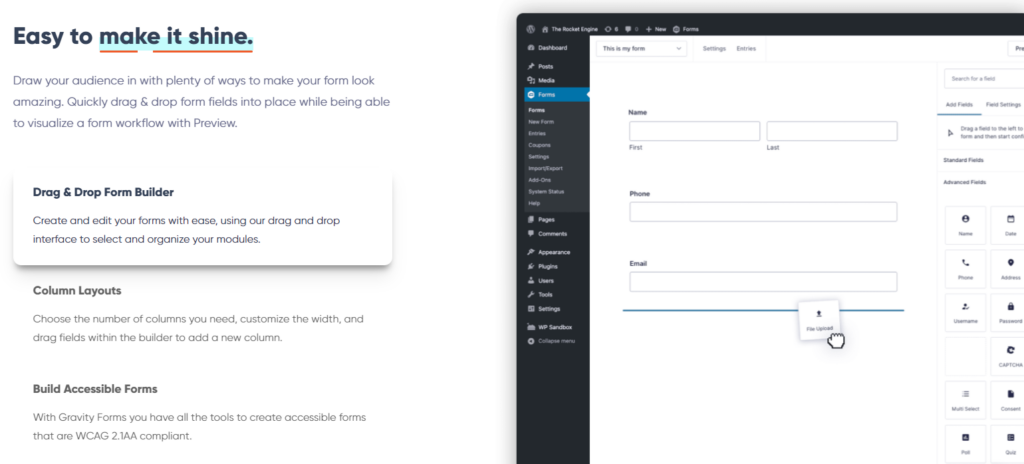
Here’s what WordPress offers:
- Integration Options: With plugins like Gravity Forms, WordPress enables seamless integration with popular e-marketing solutions.You can easily connect your forms to services like Mailchimp, GetResponse, AWeber, and more, expanding your reach and streamlining your marketing efforts.
- Advanced Functionality: WordPress plugins provide advanced features for form customization. For instance, Gravity Forms allows you to incorporate conditional logic, confirmation emails, file uploads, entry limits, and hidden fields.This extensive functionality gives you greater control over the form’s behavior and enhances user experience.
- Reusable Forms: Unlike Squarespace, WordPress allows you to create reusable forms that can be placed on any page of your website.This eliminates the need to recreate forms for different pages, saving you time and effort. You can simply insert the form wherever you need it, making the form management process more efficient.
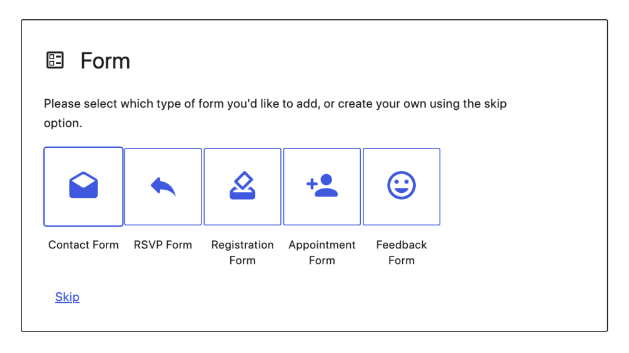
WordPress provides more extensive options for data capture, giving you greater flexibility and sophistication compared to Squarespace.
Squarespace vs WordPress – SEO tools
When it comes to SEO tools, WordPress outperforms Squarespace in several key areas:
1.) Technical SEO Control
With self-hosted WordPress, you have complete control over your technical SEO setup.
You can choose a hosting provider that offers fast page speed times and configure your site to meet Google’s Core Web Vitals requirements on Google Analytics, which prioritize page speed and performance.
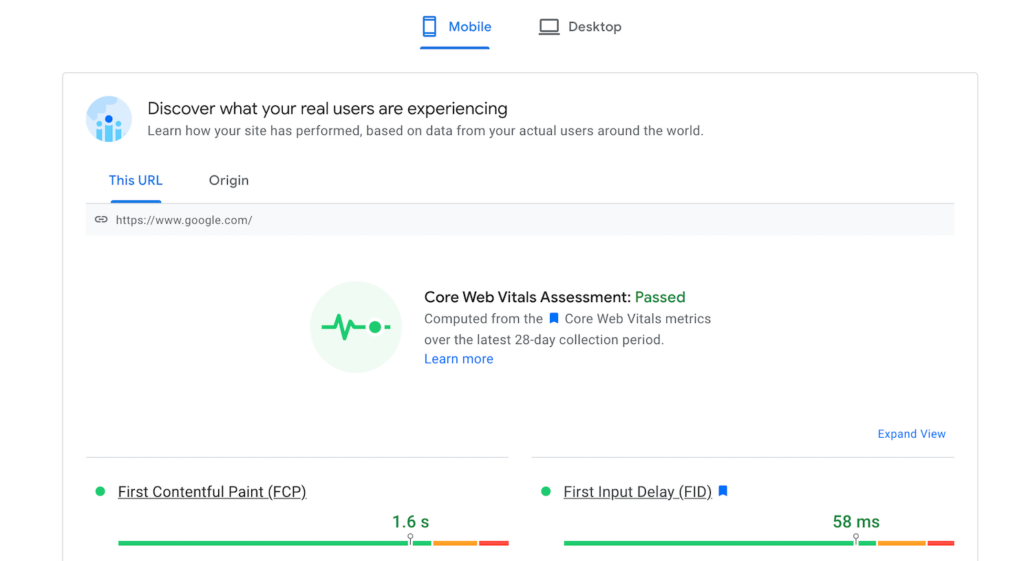
Squarespace, on the other hand, limits your control over web hosting and the ability to tweak technical SEO settings.
2.) SEO Plugins
WordPress offers a wide range of sophisticated SEO plugins, such as Yoast SEO, that evaluate your on-page SEO efforts and provide suggestions for improvement.
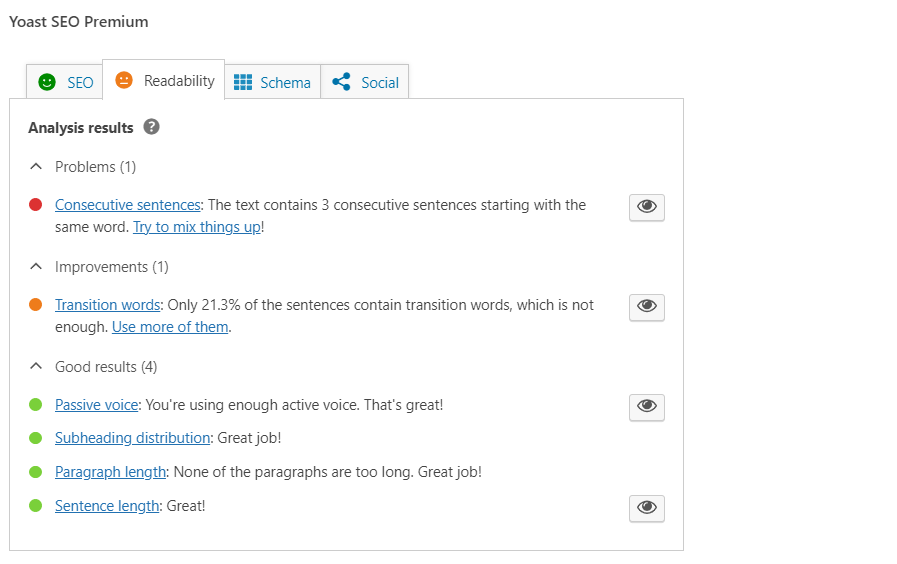
These plugins help optimize your content for search engines. Squarespace lacks similar built-in functionality for SEO optimization.
3.) Rich Snippets
Adding rich snippets to enhance search results is more straightforward in WordPress.
There are numerous WordPress plugins available that allow you to easily include relevant data and display additional information, such as ratings, reviews, and pricing, directly in search results. In Squarespace, adding rich snippets requires manual coding.

It’s important to note that Squarespace does have positive aspects when it comes to SEO.
Squarespace sites generally incorporate SSL (https), generate XML sitemaps, use clean HTML markup, and are responsive across different devices.
Squarespace also makes it easy to tweak on-page elements like page titles, meta descriptions, alt text, and headings.
However, technical SEO is just one aspect of optimizing a site for search engines.
Keyword research, producing quality content, and building backlinks are also crucial factors.
While Squarespace websites can rank well in search results, improvements are needed to meet Google’s expectations, especially regarding page loading times.
Website maintenance of Squarespace vs WordPress
When it comes to site maintenance, Squarespace provides a hassle-free experience for users. The company takes care of all the crucial technical aspects of running a website, including software updates, web hosting, and server configuration.
This hands-off approach is one of the main advantages of using Squarespace over WordPress.
On the other hand, self-hosted WordPress requires you to take responsibility for site maintenance.
You need to ensure that you are using the latest version of WordPress, configure your server correctly, and keep your WordPress plugins and themes up to date.
While some updates can be automated, it’s essential to stay vigilant because running an outdated version of WordPress or using outdated plugins increases the vulnerability of your site to hacking.
Check out our article to get a better understanding of WordPress site maintenance and the best plugins to use with the website builder.
Talking about maintenance, let’s jump to security.
Security of the two website builders
Squarespace’s Security Responsibility:
- As a hosted solution, takes on the primary responsibility for security.
- They work to ensure the system remains secure and protected from hacking and DDoS attacks.
- Squarespace provides essential security features, including:
- SSL certificate for a secure website with HTTPS.
- PCI-DSS compliance for secure credit card transactions.
- Two-factor authentication for enhanced login security.
- Automatic software updates.
WordPress Users Security Responsibility:
- With self-hosted WordPress, the responsibility for security primarily lies with the user.
- Unless a developer or agency is hired, the user is responsible for:
- Keeping WordPress versions, plugins, and themes up to date to mitigate security risks.
- Neglecting updates can make a WordPress site vulnerable to hacking attempts.
- Carefully choosing reputable and trustworthy themes and plugins to avoid malicious code.
Additional Security Tasks:
- Implementing SSL, ensuring PCI compliance for secure payment transactions, and setting up two-factor authentication are the user’s or developer’s responsibility.
Languages and Internationalization:
WordPress and Squarespace approach languages, multilingual content, and geographical locations differently. Let’s take a closer look of the website builders:
Multilingual Support: WordPress
- It is available in numerous languages and users can select their preferred language from their profile settings.
- Most WordPress themes and popular plugins are also translated into multiple languages.
- You have the flexibility to build a website in any language, and if your desired language is not available, you can translate the WordPress site yourself.
- While it doesn’t have built-in multilingual functionality, there are excellent third party plugins available that offer SEO-friendly and feature-rich solutions for creating multilingual websites.
Squarespace site
- The website builder is fully translated into six languages (English, German, French, Spanish, Italian, and Portuguese) and partially supports a few more.
- You can change your Squarespace site language and adjust the timezone or country settings.
- For eCommerce stores, you can only use currencies supported by Stripe or PayPal for product transactions.
- Creating multilingual pages in Squarespace involves duplicating your pages and manually structuring your site for each language or setting up separate sites for each language (which incurs separate billing).
- Alternatively, you can opt for Weglot, a third-party service that manages translations. Weglot offers pricing starting at $9.99 per month for one language.
Customer Support
Squarespace site
- Comprehensive customer support.
- Available through live chat, email, and social media (Twitter and Facebook Messenger).
- 24/7 support via email for Squarespace users
- Included with your account.
- Support is provided for various issues or inquiries regarding your Squarespace site.
- The quality of customer support may vary.
WordPress site
- Lacks a centralized customer support system.
- Seeking help may require navigating through multiple sources such as forums, hosting companies, or plugin providers.
- The open-source nature of WordPress contributes to the DIY approach for support.
- Building a WordPress site may require the assistance of a specialized developer or agency.
- A customer support contract with a developer or agency can provide personalized support.
- Face-to-face meetings and phone calls are possible with a WordPress support contract.
- WordPress has a steeper learning curve compared to Squarespace.
- Quality of customer support may vary depending on the source of assistance.
- No direct cost for support, but additional expenses may be incurred for specialized assistance.
Verdict: Squarespace or WordPress?
When it comes to building a website, WordPress offers considerably more power and flexibility compared to Squarespace. With WordPress, you have the ability to create virtually any type of website you desire.
However, for those with a limited budget or who prefer to build their website without the involvement of a developer, Squarespace often proves to be the better option.
3 reasons why Squarespace might be better for you
- Easier setup: Squarespace simplifies the process of setting up a website compared to WordPress.
- Bundled features: Squarespace includes many important features within the platform, such as templates, eCommerce functionality, and email marketing.
- Maintenance and security: Once your Squarespace site is set up, you can largely forget about maintenance and security concerns. Regularly updating your site with content and implementing basic SEO practices is all that’s needed.
Squarespace particularly shines as a website builder for photographers, bands, and small businesses that require a quick and hassle-free website setup.
However, if you have advanced eCommerce or blogging needs, or if you envision expanding your business to multiple locations and languages, WordPress is the more suitable option. Its vast selection of eCommerce plugins, multilingual features, and customizable themes allow for limitless possibilities.
While a Squarespace site works well for a business operating in a single location, currency, and language, WordPress offers the scalability required for long-term growth.
In summary, WordPress excels at building complex and scalable business websites. If you choose the WordPress route, it is advisable to work with an experienced developer or agency to ensure a polished and customized website while benefiting from ongoing maintenance and security support.
To decide if Squarespace or WordPress, consider three questions:
- Do I have a large budget?
- Do I have the time to invest?
- Do I have complex requirements for my site?
If your budget is tight and you have time, building a Squarespace site yourself is a viable option due to its affordable monthly pricing. Conversely, if budget constraints are not an issue, WordPress is recommended, but with the assistance of a developer. Contact us for competitive quotes on a WordPress project.
For those with limited time and technical skills determined to build their website independently, Squarespace is the preferable choice. It is user-friendly, and most essential features are readily available.
Lastly, if you have complex requirements for your site, WordPress is the platform of choice due to its significant functional flexibility.
Below is a summary highlighting key reasons for choosing either Squarespace or WordPress over the other.
Summary of Squarespace vs WordPress
When comparing Squarespace and WordPress as website-building platforms, WordPress emerges as the superior choice.
Here is a summary of the pros and cons of both platforms:
Squarespace
Pros:
- User-friendly interface, particularly suitable for small websites.
- Offers a polished user experience.
- Hassle-free setup process.
- Customer support available via Twitter, live chat, and email.
Cons:
- Higher costs compared to shared hosting options.
- Limited design choices.
- Limited set of features.
- Limitations may hinder business growth.
WordPress
Pros:
- Relatively easy to use with a manageable learning curve.
- Highly flexible, allowing the creation of any type of website.
- Extensive collection of themes and plugins.
- Powerful eCommerce capabilities.
- Low initial cost to start a website.
- Community support through online forums.
Cons:
- Requires manual installation of updates and regular backups.
- Scaling resources and upgrading hosting is the user’s responsibility as the business grows.
- User is responsible for managing website security.
Considering the pros and cons, it is evident that WordPress is the superior platform for starting a website.
The freedom to grow and customize your website according to your needs is crucial for businesses, and WordPress provides this flexibility at a lower cost compared to other platforms.
Therefore, it is recommended not to compromise this freedom for any cost, as WordPress offers a robust and cost-effective solution for website development.
Alternative website builders
While WordPress and Squarespace are popular website builders there are several WordPress alternatives available that offer unique advantages and features.
Web builders like Wix and Weebly provide an all-in-one solution for website creation, hosting, and maintenance, while also offering a user-friendly interface and customization options.
Other alternatives like Tumblr and Medium offer a free publishing platform for bloggers and content creators. Ultimately, the choice of site builder will depend on individual needs, preferences, and technical expertise.
It’s important to research and compare different options before making a decision to make sure that the website creator selected is the best fit for the project’s requirements. To help you decide we created a list of the best website builders on the market.
Frequently Asked Questions
The choice between Squarespace and WordPress depends on individual needs.
Squarespace is user-friendly and suitable for quick and easy website setup. WordPress is flexible and powerful, allowing for customization and scalability. Squarespace is ideal for simplicity, while WordPress offers more possibilities for customization and growth.
Deciding whether to switch from Squarespace to WordPress depends on your specific needs and preferences.
If you require more flexibility, customization options, and scalability for your website, WordPress may be a better choice. It offers a vast collection of themes, plugins, and advanced features.
However, if you value ease of use, hassle-free maintenance, and don’t require extensive customization, sticking with Squarespace could be the right decision. Consider your website goals, technical skills, and the level of control you desire before making a switch.
